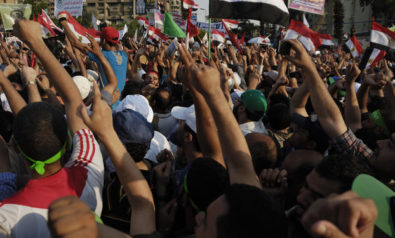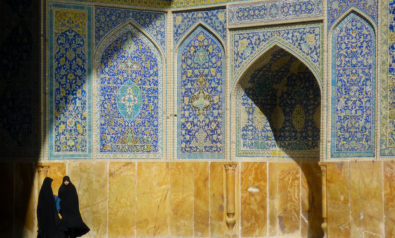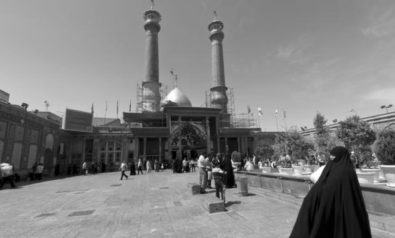A brief look at the interplay of Islam and political thought at a time when Islamist movements are gaining unprecedented access to the highest levels of power.
Background
The history of Islam and politics encompasses a wide variety of thinkers and political ideas. It is pivotal to understand the historical context in order to comprehend the rise of Islamist movements in the Middle East and North Africa.
Modern Islamist political thought was in part rooted in the rejection of European encroachment into the Muslim world, as for example Jamal al-Din al-Afghani's work demonstrates. Al-Afghani, reportedly of Persian and Shi'a origin, promoted pan-Islamic unity while being a staunch critic of the British Empire. Together with Mohammed Abduh, one of his students and later a liberal reformer in Egypt, al-Afghani called for modernization and education in Islam while arguing for adherence to Islamic principles.
Part of this tradition of political activism is rooted in the Muslim Brotherhood. Founded in 1928 in Egypt, it is now the biggest Islamist movement in the Arab world. Its founder, Hassan al-Banna, is said to have been influenced by Abduh's ideas. Apart from its anti-colonialist stance, one of the movement's main demands was to introduce Shari'a (Islamic law) “as the basis controlling the affairs of state and society.” The Sunni movement was outlawed in 1948 and had to endure decades of suppression. Leading Brotherhood member Sayyid Qutb, especially after his execution in 1966, became famous for his writings on jihad (in its most prominent meaning of “struggle” and referring to a holy war) which allegedly influenced armed Islamist groups like Islamic Jihad and al-Qaeda.
A momentous event during a general Islamic revivalism in the 1970s was Iran's Islamic revolution in 1979. The revolution's leader, Ayatollah Ruhollah Khomeini, consolidated his power and was able to establish a constitution which installed his velayat-e-faqih (Guardianship of the Jurist) principle and made him Iran's Supreme Leader. Efforts to impose Islamic law in the domestic realm followed and his official foreign policy aimed to strengthen pan-Islamic unity.
In Algeria's first multi-party elections since independence, the Islamist party, the Islamic Salvation Front, won a relative majority in 1991 but the elected parliament was dissolved and a civil war broke out. Similarly, when the Palestinian Islamist group Hamas won a relative majority in free and fair elections for the Palestinian legislature in 2006, an armed struggle ensued.
Why is Islamism and the Arab Uprisings Relevant?
As a result of the Arab Uprisings, political Islam is more relevant than ever as Islamist movements have gained unprecedented access to the highest levels of power in the newly established political arenas.
In Tunisia, the country which sparked the wave of uprisings, the Islamist party En-Nahda, led by Rashid Ghannoushi, won a relative majority in the Constituent Assembly elections. Debates about En-Nahda's moderateness, the role of Shari'a, and the party's position towards ultra-conservative Salafists are still ongoing. So far, Shari'a has not been made the basis of the constitution. However, Article 28 of the draft constitution in particular, which allegedly describes women as “complimentary” to men, has led to great concerns and protests.
In Egypt, parliamentary elections gave Islamist parties – the Muslim Brotherhood and the Salafist An-Nour party – a two-thirds majority. In June 2012, the Muslim Brotherhood's candidate, Mohammed Morsi, became the first civilian and Islamist president of Egypt. Nevertheless, the Supreme Constitutional Court whose judges had been appointed by former President Mubarak dissolved parliament during the presidential campaign. Similar to Tunisia, the role of Shari'a in the constitution remains a controversial issue.
Morocco has not experienced the same wide-scale protests as some of its North African neighbours. King Mohammed VI tried to subdue protests against his rule and the dire economic situation by changing the constitution and initiating modest reform. Parliamentary elections in November 2011 brought the Justice and Development Party into power and its leader, Abdelilah Benkirane, became Morocco's first Islamist prime Minister.
Overall, in most countries, especially the ones which were affected by the Arab Uprisings, the exact interplay between Islam and politics is yet to be determined. However, it remains crucial to understand the current rise of Islamists in its historical context.
For more than 10 years, Fair Observer has been free, fair and independent. No billionaire owns us, no advertisers control us. We are a reader-supported nonprofit. Unlike many other publications, we keep our content free for readers regardless of where they live or whether they can afford to pay. We have no paywalls and no ads.
In the post-truth era of fake news, echo chambers and filter bubbles, we publish a plurality of perspectives from around the world. Anyone can publish with us, but everyone goes through a rigorous editorial process. So, you get fact-checked, well-reasoned content instead of noise.
We publish 2,500+ voices from 90+ countries. We also conduct education and training programs on subjects ranging from digital media and journalism to writing and critical thinking. This doesn’t come cheap. Servers, editors, trainers and web developers cost money.
Please consider supporting us on a regular basis as a recurring donor or a sustaining member.
Support Fair Observer
We rely on your support for our independence, diversity and quality.
Will you support FO’s journalism?
We rely on your support for our independence, diversity and quality.









